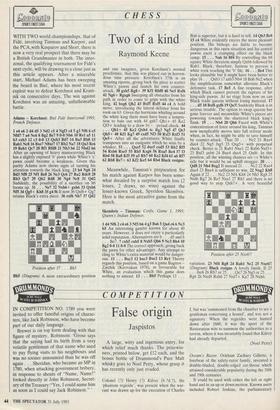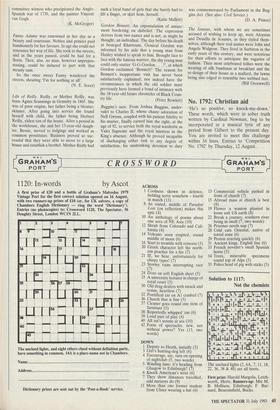DoMMON D's COMPETITION
False origin
Jaspistos
IN COMPETITION NO. 1789 you were invited to offer fanciful origins of charac- ters, like Jack Robinson, who have become part of our daily language. Brewer is on top form dealing with that figure of mystery, Robinson: 'Grose says that the saying had its birth from a very volatile gentleman of that name who used to pay flying visits to his neighbours and was no sooner announced than he was off again . . . Sheridan, who became an MP in 1780, when attacking government bribery, in response to shouts of "Name, Name!" looked directly at John Robinson, Secret- ary of the Treasury:"Yes, I could name him as soon as I could say Jack Robinson." ' A large, witty and ingenious entry, for which relief much thanks. The prizewin- ners, printed below, get £12 each, and the bonus bottle of Drummond's Pure Malt whisky goes to Noel Petty, whose grasp it has recently only just evaded.
Colonel (?) Henry (?) Kilroy (b.?d.?), the `phantom regicide', was present when the war- rant was drawn up for the execution of Charles I, but was 'summoned from the chamber to see a gentleman concerning a hound', and was not a ry signato. When the regicides were hunted down after 1660, it was the sport of the Restoration wits to summon the authorities to a tavern, where it was invariably found that Kilroy had already departed. (Noel Petty) Occam's Razor. Ockham Zachary Gillette, a forebear of the safety-razor family, invented a double-bladed, double-edged cut-throat which attained considerable popularity during the 18th and 19th centuries. It could be used with either the left or right hand and in an up or down motion. Known users included Robert Jenkins, the parliamentary
committee witness who precipitated the Anglo- Spanish war of 1739, and the painter Vincent van Gogh. (K. McGregor) Fanny Adams was renowned in her day as a beauty and courtesan. Nobles and princes paid handsomely for her favours. In age she could not renounce her way of life. She took to the streets, and as the years passed, could be had for a florin. Then, alas, no man, however unprepos- sessing, could be induced to part with that measly sum.
So the once sweet Fanny wandered the streets, shouting 'I'm for nothing at all'.
(N. E. Soret) Life of Reilly. Reilly, or Mother Reilly, was born Agnes Scunnings in Grimsby in 1865. She was of poor origins, her father being a bloater- skinner. After going into service she found herself with child, the father being Herbert Reilly, eldest son of the house. After a period in the workhouse, she and her 13-year-old daugh- ter, Bessie, moved to lodgings and worked as common prostitutes. Business proved so suc- cessful that they were able to move to a large house and establish a brothel. Mother Reilly had such a loyal band of girls that she barely had to lift a finger, or skirt hem, herself.
(Katie Mallett) Gordon Bennett. An expostulation of amaze- ment bordering on disbelief. The expression derives from two names and is not, as might be thought, an individual. The day before his death at besieged Khartoum, General Gordon was informed by his aide that a young man from Hanley wished to speak to him. Brought face to face with the famous warrior, the shy young man could only stutter `G-G-Gordon . . .?', at which Gordon exclaimed 'Bennett!' The reason for Bennett's inopportune visit has never been satisfactorily explained; nor indeed have the circumstances in which the old soldier must previously have formed a bond of intimacy with the 18-year-old future chronicler of Black Coun- try life. (Peter Rowlett) Buggins's turn. From Joshua Buggins, under- valet to Charles H, whose chaste adoration of Nell Gwynn, coupled with his patient fidelity to his master, finally earned him the right, at the age of 92, to service both the royal wardrobe as Valet Supreme and the royal mistress in the King's absence. Although he proved incapable of discharging either task to any degree of satisfaction, his unshrinking devotion to duty was commemorated by Parliament in the Bug- gins Act. (See also: Civil Service.) (D. A. Prince) The Joneses, with whom we are sometimes accused of wishing to keep up, were Aloysius and Drusilla de Jeaunes, as they styled them- selves, although their real names were John and Angela Widgeon. They lived in Surbiton in the early years of this century, and were notorious for their efforts to anticipate the vagaries of fashion. Their most celebrated follies were the wearing of silk bandanas at breakfast and the re-design of their house as a mallard, the lawns being also edged to resemble two webbed feet.
(Bill Greenwell)



















































 Previous page
Previous page